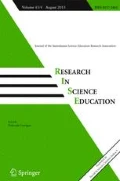Abstract
What is reasoning? Piaget and his collaborators have described a developmental and epistemological approach (Inhelder & Piaget, 1958). Information processing theorists describe mental activity in terms of conditions and “actions” called forth without further intermediate steps by these conditions, where “actions” may be overt behaviours or mental operations (Newell, 1973). To the classroom teacher, both of these points of view probably appear remote and theoretical, far from the comments, questions, insights, and misunderstandings exhibited by their students. This article, an abbreviated version of a longer presentation (Karplus, 1980), attempts to present an intermediate level of analysis, close enough to classroom occurences to be easily applied, but also sufficiently general to permit the linking of student behaviour with teaching strategies.
Similar content being viewed by others
References
ADAPT.Multidisciplinary Piagetian-based programmes for college freshmen. Lincoln, Nebraska: University of Nebraska, 1977.
BIGGS, E. Investigations and problem-solving in mathematical education. A.G. Howson (Ed.)Proceedings of the second international congress on mathematical education. London: Cambridge University Press, 1973.
BRUNER, J.The process of education. Cambridge, Mass.: Harvard University Press, 1960.
CASE, R. Intellectual development and instruction; a neo-Piagetian view. In Lawson, A.E. (Ed.)The psychology of teaching for thinking and creativity. Columbus, Ohio: ERIC-SMEAC, 1980.
COLLIS, K. A study of concrete and formal operations in school mathematics. Ph.D. thesis, University of Newcastle, N.S.W. 1972.
DIENES, Z.P.Building up mathematics. London: Hutchison Education, 1971.
EAKIN, J. & KARPLUS, R. SCIS final report. Berkeley, Cal.: University of California, 1976.
GAGNE, R.The conditions of learning. New York: Holt, Rinehart and Winston, 1977.
INHELDER, B. & PIAGET, J.The growth of logical thinking from childhood to adolescence. New York: Basic Books, 1958.
KARPLUS, R. Teaching for the development of reasoning. In Lawson, A. E. (Ed.)The psychology of teaching for thinking and creativity. Columbus, Ohio: ERIC-SMEAC, 1980.
KARPLUS, R., LAWSON, A.E., WOLLMAN, W.T., APPEL, M., BERNOFF, R., HOWE, A., RUSCH, J.J. & SULLIVAN, F.Science teaching and the development of reasoning. Berkeley, Cal.: University of California, 1977.
KARPLUS, R. & LAWSON, C.A. SCIS teachers' handbook. Berkeley, Cal.: University of California, 1974.
KARPLUS, R. & THIER, H.D.A new look at elementary school science. Chicago, Illinois: Rand McNally, 1967.
LAWSON, A.E. The development and validation of a classroom test of formal reasoning.Journal of Research in Science Teaching, 1978, 15(1), 11–24.
LAWSON, A.E., BLAKE, A.J.D. & NORDLAND, F.H. Training effects and generalisation of the ability control variables in high school biology students.Science Education, 1975, 49, 387–396.
LAWSON, A.E. & WOLLMAN, W.T. Encouraging the transition from concerete to formal cognitive functioning—an experiment.Journal of Research in Science Teaching, 1976, 13, 413–430.
LOVELL, K. Some aspects of the growth of the concept of a function. In Rosskopf, M., Steffe, L. & Tabac, s. (Eds.)Piagetian cognitive development research and mathematical education. Reston, VA: National Council of teachers of mathematics, 1971.
LOVELL, K. & BUTTERWORTH, I.B. Abilities underlying the understanding of proportionality.Mathematics Teaching, 1966, 37, 5–9
LUNZER, E.A. Problems of formal reasoning in test situations. In Mussen, P.H. (Ed.)European Research in cognitive development. Monographs of the Society for Research in Child Development (2, Whole No. 100), 1965, 18–46.
LUNZER, E.A. Formal reasoning: A reappraisal. In Presseisen, B.Z., Goldstein, D. & Appel, M.H. (Eds.)Topics in cognitive development, Vol. 2. New York: Plenum Press, 1978.
LUNZER, E.A. & PUMFREY, P.D. Understanding proportionality.Mathematics Teaching, 1966, 34, 7–12.
NEWELL, A. Production systems: Models of control structures. In Chase, W.G. (Ed.)Visual information processing. New York: Academic Press, 1973.
SCIENCE CURRICULUM IMPROVEMENT STUDY. Chicago, Ill.: Rand MacNally, 1970–74.
THIER, H.D., KARPLUS, R., KNOTT, R., LAWSON, C.A. & MONTGOMERY, M.Rand McNally SCIS, Chicago, Ill.: Rand McNally, 1977–1978.
WOLLMAN, W.T. & KARPLUS, R. Intellectual development beyond elementary school V: Using ratio in differing tasks.School Science and Mathematics, 1974, 74, 593–613.
WOLLMAN, W.T. & LAWSON, A.E. The influence of instruction on proportional reasoning of seventh graders.Journal of Research in Science Teaching, 1978, 15(3), 227–232.
Rights and permissions
About this article
Cite this article
Karplus, R. Teaching for the development of reasoning. Research in Science Education 10, 1–9 (1980). https://doi.org/10.1007/BF02356303
Issue Date:
DOI: https://doi.org/10.1007/BF02356303



